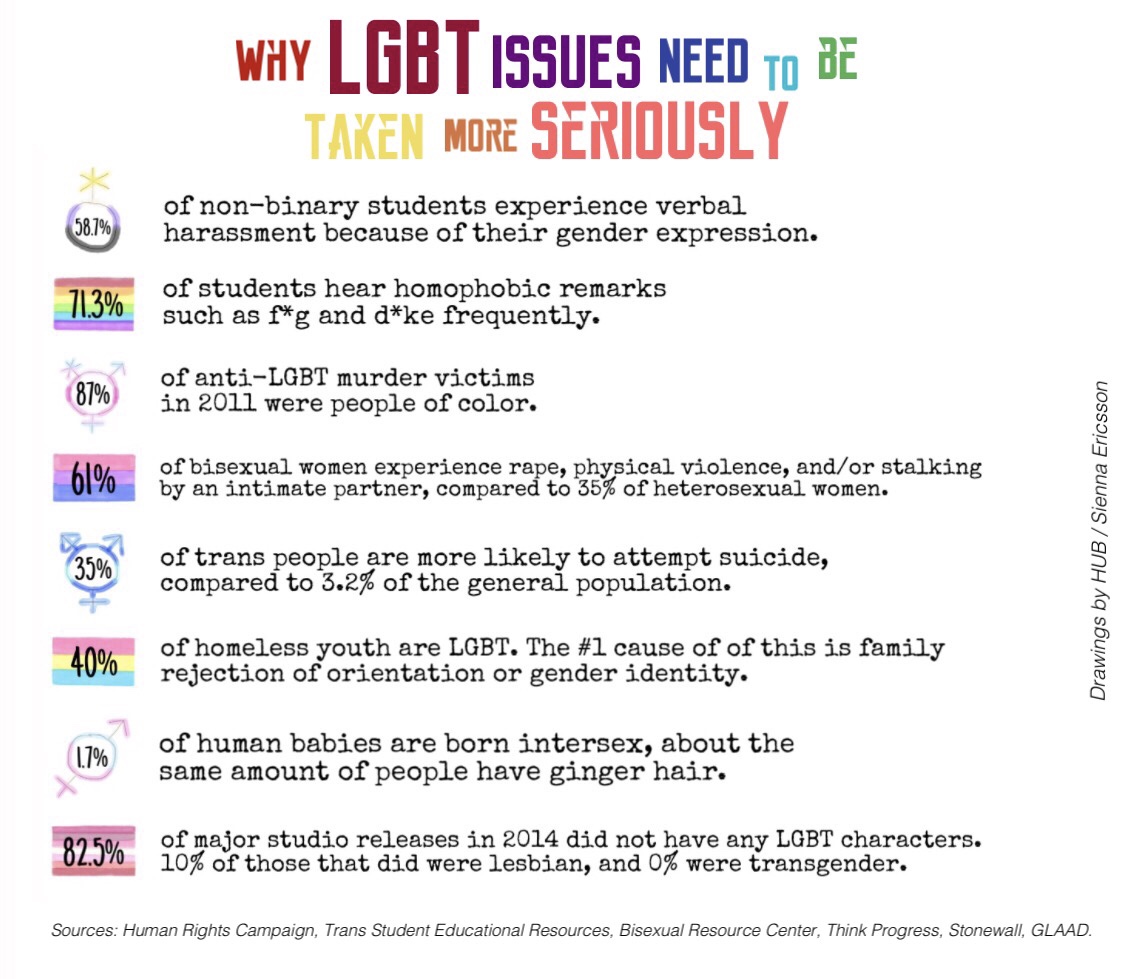Trump’s first year in office, an overview
By Tess McIntyre & Kate Macaulay
BlueDevilHUB.com Editors–
Jan. 20 marked the one year anniversary of Donald Trump’s inauguration into the White House.
Over the last 12 months, the president has divided the public’s opinions, worked on some campaign promises and taken many actions which consumed the public’s attention. Some of these actions have been covered heavily in the media, while others passed under the radar.
“The year of 2017 was an incredibly divided time with differing opinions creating distractions from the dire issues that need the attention of the public,” said Erika Faith, vice president of the Davis High Feminism Club.
From Jan. 2017 to Jan. 2018, here is last year in review.
[toggle title=”January 2017″ state=”closed”] The inauguration was met with protests across the globe. While more than four million people attended the nationwide Women’s March on Washington on Jan. 21, similar marches were held in other countries. The purpose of these marches was to advocate for women’s rights, healthcare, racial justice and more.
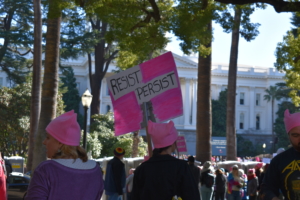
“In my opinion the Women’s March is a lot more than a ‘screw Trump’ message, as posters convey, but a show of support for women who feel isolated and attacked by the administration,” senior Maddie Price said.
However, the protests effected little of Trump’s following decisions. On Jan. 27, Trump passed Executive Order 13769, commonly referred to as the “Muslim Ban.”
Trump also backed out of the Trans-Pacific Partnership, fulfilling his first campaign promise of the term. Trump signed off on the last Executive Order of the month on Jan. 30. This order stated that “it is important that for every one new regulation issued, at least two prior regulations be identified for elimination.” [/toggle]
[toggle title=”February 2017″ state=”closed”] An executive order pertaining to water pollution was signed on Feb. 28. This order said that it is important to keep America’s navigable water pollution free, while still expanding the economy. Navigable water is defined as “the waters of the United States, including the territorial seas,” according to 33 U.S.C. 1362(7).
Junior Aily O’Hara found this order to be hypocritical, as Trump signed a bill to end the Office of Surface Mining’s Stream Protection Rule on Feb. 16. Without this order, which was passed under the Obama administration, waterways would no longer be protected from coal related waste.
“I think he’s just against Obama and anything Obama stands for, even if its objectively good, like keeping our water clean,” O’Hara said. [/toggle]
[toggle title=”March 2017″ state=”closed”] On March 6, Trump signed a second travel ban. This ban had the same intentions as the first, but was aimed at Iran, Libya, Somalia, Sudan, Syria and Yemen. This order also called for the 120 day suspension of allowing refugees to travel into the U.S.
On March 29, an executive order was signed that established a committee to investigate the opioid crisis and drug addiction.
Senior Andrey Pravdić thinks that the purpose of this order was just to prove to his supporters that he was going to make a change in their favor.
“Ultimately I think his attempts are just an appeal to his base, as most of his supporters live in Middle America where the opioid crisis hits pretty hard,” Pravdić said. [/toggle]
[toggle title=”April 2017″ state=”closed”]
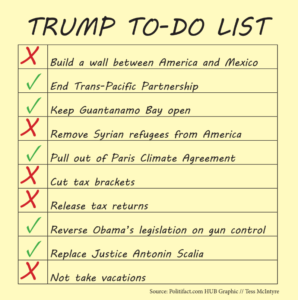
Neil Gorsuch was confirmed into the Supreme Court on April 7, fulfilling one of Trump’s campaign promises.
Also on April 7, Trump gave permission for a missile strike on Syria in response to a chemical weapon attack that killed many Syrian civilians. This was the first U.S. military action taken against Syria’s President during the Syrian civil war.
Sophomore Paloma Torres thought that the missle strike “made no sense,” because the chemical weapon attack was not directed at the United States.
“I feel like that was unnecessary, if Syria wasn’t doing anything to the United States then it wasn’t really that necessary,” Torres said.
Senior Alondra Arambula agreed. “I think he didn’t approach the situation right. He just does these actions that affect innocent people, and doing that makes us look bad.” [/toggle]
[toggle title=”May 2017″ state=”closed”] Federal Bureau of Investigations (FBI) Director James Comey was fired on May 9 while investigating if the Russian government had a hand in Trump’s 2016 election.
Junior Aakash Mishra thought that Trump fired Comey in an act of self defense in order to deter the investigation.
“Trump was trying to defend himself but forgot about the American people. The people are always watching and he’s not going to get away with blocking the Russia investigation,” Mishra said. [/toggle]
[toggle title=”June 2017″ state=”closed”] On June 1, Trump pulled out of the Paris Climate Agreement, an international agreement aimed to stall climate change by reducing all greenhouse gas emissions, and ceased any more payments towards the program.
Sophomore Adam Brugger thinks that it is everyone’s responsibility to reduce the effects of climate change.
“It’s our responsibility to make sure the earth is healthy. We owe it to the next generation and the species that inhabit it,” Brugger said.
June also brought reform to the Department of Veterans Affairs (VA). On June 23, Trump signed a bill making it easier for the VA to fire employees. In 2014, there was a scandal involving the VA not giving veterans adequate healthcare, and part of Trump’s campaign promises were to increase veterans’ healthcare and listen to complaints about the VA.
By June of his first year, Trump had already increased the VAs budget by 3.5 percent, and delivered more funds to provide the needed healthcare to U.S. veterans. [/toggle]
[toggle title=”July 2017″ state=”closed”] According to the Washington Post, Trump played golf at least eight times in July and signed no new legislation. He also visited Europe for the first time as president, and following that, spent 18 days visiting his own properties.
“I don’t think it’s wrong [to take breaks] and I’m sure every other president has had a break. It’s not like you have to be doing something every day,” senior Baxter Whittemore said.
While no legislation was signed, Trump tweeted about banning transgender people from serving in the military on July 23, citing the “tremendous medical costs” as a burden.
After consultation with my Generals and military experts, please be advised that the United States Government will not accept or allow……
— Donald J. Trump (@realDonaldTrump) July 26, 2017
….Transgender individuals to serve in any capacity in the U.S. Military. Our military must be focused on decisive and overwhelming…..
— Donald J. Trump (@realDonaldTrump) July 26, 2017
….victory and cannot be burdened with the tremendous medical costs and disruption that transgender in the military would entail. Thank you
— Donald J. Trump (@realDonaldTrump) July 26, 2017
“If citizens of any gender are permitted to enlist, then why should someone’s birth gender be a limiting factor?” said junior Nina Martin, Genders and Sexualities Alliance (GSA) member. “It makes absolutely no sense as a country to refuse the protection and aid of any capable individual willing to fight for our country.” [/toggle]
[toggle title=”August 2017″ state=”closed”] Trump pardoned Joe Arpaio, former Arizona sheriff, on Aug. 25. Arpaio had been found guilty of criminal contempt for illegally detaining immigrants in July. This was the first pardon Trump made during his presidency, and he did not consult the Justice Department before releasing his pardon statement, per the usual.
“It was immature for Trump to act that way. It really reveals a lot about his character,” junior Grace Hickerson said. “Who would choose to pardon someone who has clearly done things to act against the people?”
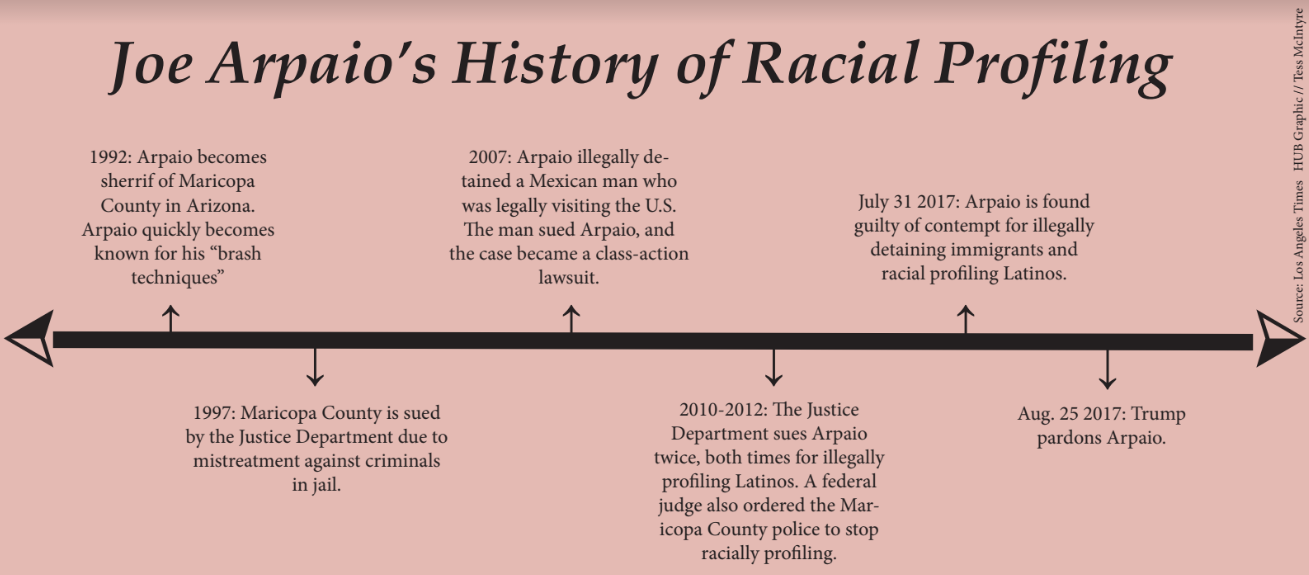
[/toggle]
[toggle title=”September 2017″ state=”closed”] Sept. 5 was the day Trump ended the Deferred Action for Childhood Arrivals (DACA) program. Without DACA, undocumented immigrants who have lived in the United States their whole lives will have no protection from deportation.
“With California inhabited by a very diverse population of immigrants those who may be undocumented face deportation and separation from their families,” Faith said.
On Sept. 24 a new executive order was signed that added more countries to the travel ban list. The order said that immigrants entering the United States from Chad, Iran, Libya, North Korea, Syria, Venezuela, Somalia and Yemen would be “detrimental to the interests of the United States.”
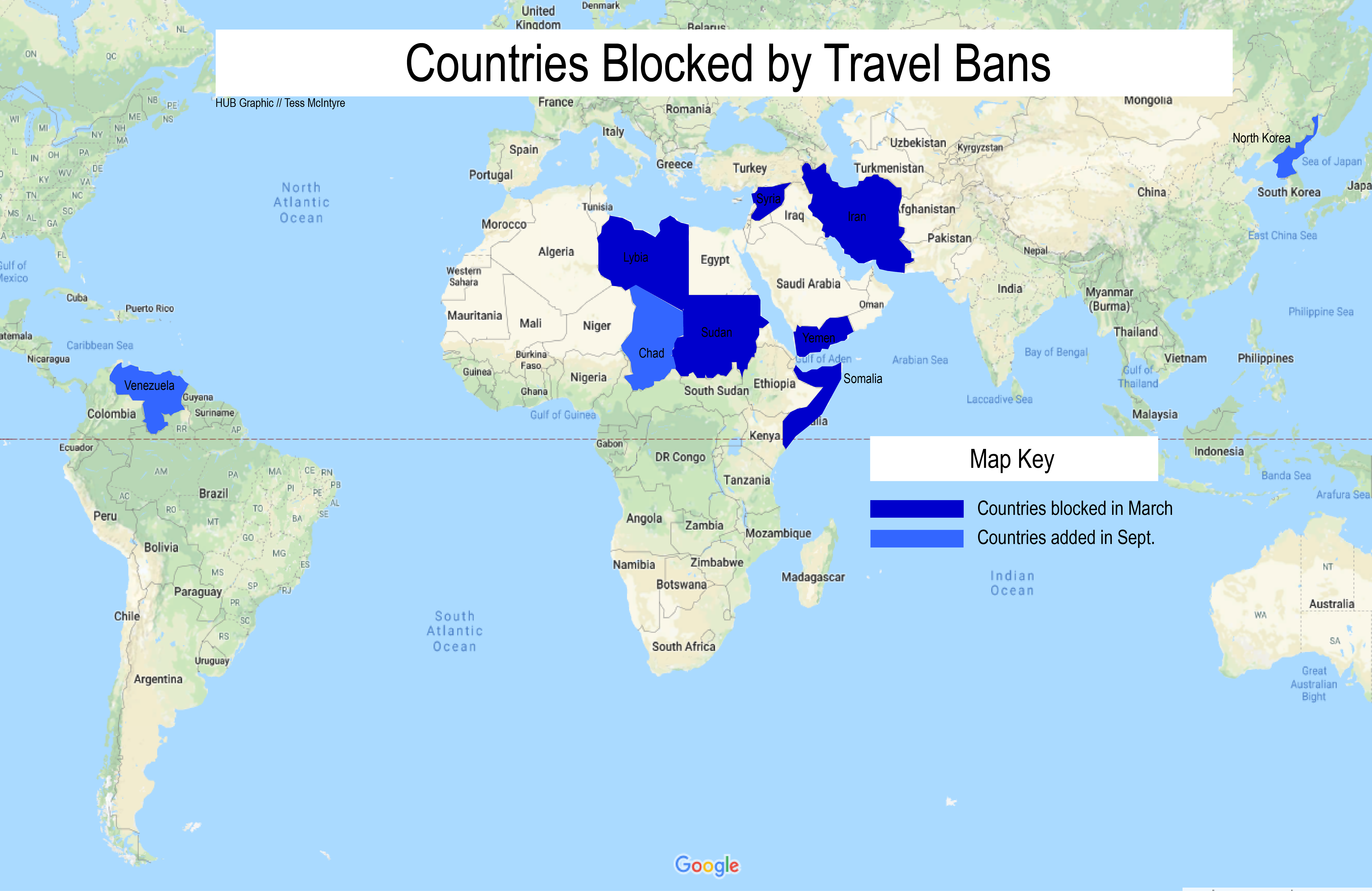
In a tweet, Trump said: “Making America safe is my number one priority. We will not admit those into our country we cannot safely vet.”
Making America Safe is my number one priority. We will not admit those into our country we cannot safely vet.https://t.co/KJ886okyfC
— Donald J. Trump (@realDonaldTrump) September 24, 2017
“All [the travel ban] is doing is furthering the divide between our country when we should be working toward opening borders and working toward no territorial boundaries,” sophomore Cedric Hughes said. [/toggle]
[toggle title=”October 2017″ state=”closed”] On Oct. 6, Trump submitted his “Women, Peace, and Security Strategy,” which describes how U.S. Agency for International Development (USAID), and the Department of Defense will train and promote women in legislation to participate in both conflict and peace negotiations.
Later that month, on Oct. 26, Trump signed a disaster relief act, providing $36.5 billion to the Federal Emergency Management Agency (FEMA), the Department of Agriculture (USDA) and the Department of the Interior. This fund is only to be used for relief and recovery efforts within the country, addressing the recent hurricanes and wildfires. [/toggle]
[toggle title=”November 2017″ state=”closed”] In this month, Trump addressed two issues on Nov 21.
The first being a simple approval process for job training and apprenticeship programs under the GI Bill. This approval could transfer between states, eliminating the need for approval in each state if a big companies headquarters resided in one but had workers all over the country.
Secondly, Trump signed the Federal Information Technology Acquisition Reform Act (FITARA) Enhancement Act of 2017, which repealed the expiration dates of a series of requirements for the National Defense to report regarding information technology (IT), making them permanent. [/toggle]
[toggle title=”December 2017″ state=”closed”] On Dec. 3, United States ambassador to the United Nations, Nikki Haley, and Trump made the decision to no longer be involved in the New York Declaration for Refugees and Migrants in favor of creating their own policy on migration.
”I think it was a risky move on Trump’s part,” junior Yasmeen Dmeiri said.
On Dec. 22, Trump signed a major tax overhaul into law. This tax cut would slash seven tax brackets, increase standard deductions and lower corporate tax rates. DHS Economy teacher Pete Hawes said that one of the negatives to the tax bill is that it may discourage people from giving to charity. [/toggle]
[toggle title=”January 2018″ state=”closed”] On Jan 3 and 8, two bills regarding human trafficking were signed into law. The first bill was to have the Federal Motor Carrier Safety Administration’s education program cover human trafficking prevention, while the second was to forbid people from driving commercial vehicles for life if they participate in human trafficking.
Junior Jade Lundy thinks that Trump’s “crackdown” on this issue is great because it has good intentions and brings awareness to the problem, however, she finds this in conflict with his most recent immigration policies.
“The latest [immigration law] has stated that human trafficking is exacerbated by employers who are able to mistreat and underpay immigrant workers,” Lundy said. “Since immigrants are currently very much afraid of being deported under Trump’s admin, they will be less inclined and less able to report and fix mistreatment issues which lead to trafficking.”
Starting off Trump’s second year in office was a series of women’s marches on Jan. 21, continuing the message from the previous year.
“The most significant difference by far was that this year’s event was less centered around anger towards Trump’s win, and more about empowerment and the issues surrounding women from all different backgrounds,” Faith said. [/toggle]



